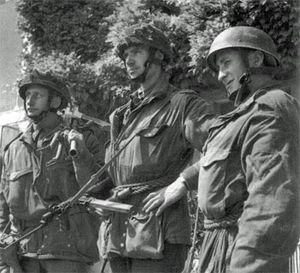British 6th Airborne Division
| 6th Airborne Division | |
|---|---|

Glider infantry of the 2nd Battalion, Oxfordshire and Buckinghamshire Light Infantry, of the 6th Airlanding Brigade, 6th Airborne Division, in Normandy 1944.
|
|
| Active | 1943–1948 |
| Country |
|
| Branch |
|
| Type | Infantry |
| Role | Airborne forces |
| Size | Division |
| Nickname(s) | Red Devils |
| Motto(s) | Go To It |
| Engagements |
World War II Operation Deadstick Operation Tonga Battle of Merville Gun Battery Operation Mallard Battle of Bréville Advance to the River Seine Battle of the Bulge Operation Varsity Mandate Palestine |
| Commanders | |
| Notable commanders |
Sir Richard Gale Sir James Cassels |
| Insignia | |
| Emblem of the British airborne forces |
|
The 6th Airborne Division was an airborne infantry division of the British Army during the Second World War. Despite its name, the 6th was actually the second of two airborne divisions raised by the British Army during the war, the other being the 1st Airborne Division. The 6th Airborne Division was formed in World War II, in mid-1943, and was commanded by Major-General Richard N. Gale. The division consisted of the 3rd and 5th Parachute Brigades along with the 6th Airlanding Brigade and supporting units.
The division's first mission was Operation Tonga on 6 June 1944, D-Day, part of the Normandy landings, where it was responsible for securing the left flank of the Allied invasion during Operation Overlord. The division remained in Normandy for three months before being withdrawn in September. While still recruiting and reforming in England, it was mobilised again and sent to Belgium in December 1944, to help counter the surprise German offensive in the Ardennes, the Battle of the Bulge. Their final airborne mission followed in March 1945, Operation Varsity, the second Allied airborne assault over the River Rhine.
...
Wikipedia

